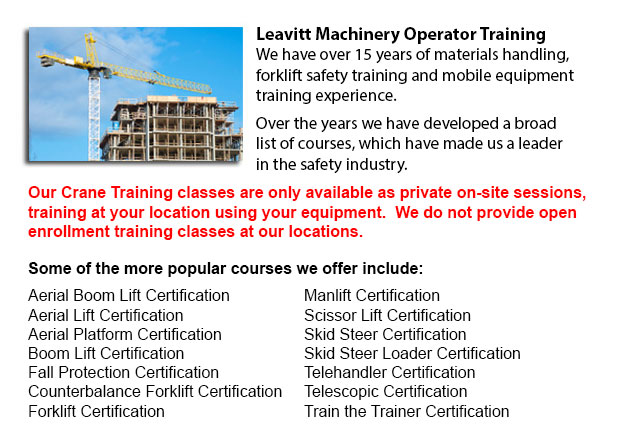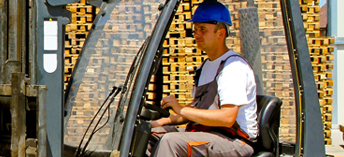
Kingston Crane Operator Classes - Crane operator training is for supervisors and operators of overhead lifting machinery. The course is suitable for both current and new operators. Course content includes applicable state, federal and provincial safety regulations. The first component of training consists of comprehensive in-class instruction and examination. Following that is a hands-on customized session along with practical lessons and assessment.
The content of the course applies to all types and categories of overhead lifting crane devices. The instruction will particularly focus on all aspects of crane operation that could be performed at the trainee's workplace. Upon completing the course, people training would learn how to operate specific overhead lifting devices, attachments and related parts safely and efficiently.
The purpose of the operator course is to identify any potentially dangerous habits that an operator can develop while operating an overhead crane. Costly damage to products and equipment can be avoided with right habits. Training reduces the likelihood of a workplace injury or incident taking place.
The course would encompass roughly eight hours of classroom instruction with a couple of hours of hands-on customized, on-site training. Participants would be graded on their knowledge of training material via an evaluation of their practical knowledge and written tests. The minimum acceptable score is 80 percent.
The in-class session, the trainee will learn regarding causes of occurrences and damages, legislation and guidelines, internal responsibility, danger awareness, design principles and basic equipment, capacity ratings/load weight calculations, pre-shift equipment checks, safe hoisting/operating techniques, equipment applications/rigging, types of hardware, hitches and angles, operator/pedestrian safety, turning/flipping loads safely, hand signals for slingers and operators.
The practical training and evaluation portion of the course must be pre-scheduled. This customized part of the training will be held at the trainees' facility. The length of this practical training part is one to two hours. Two operators at a time will be trained by the instructor on skills like planning the lift, right rigging practices and safe operation.
Upon finishing the practical operating instruction and evaluation and the in-class instruction, the trainee will write a test. Signed safety rules would be needed from each participant. Individual wallet certificates would be given to successful trainees. A framed wall certificate will be provided to the company.
-
Narrow Aisle Forklift / Order Picker Training / Electric Pallet Jack / Electric Pallet Truck Training in Kingston
A pallet lift is a piece of equipment dedicated in the moving of pallets of various dimensions and weights. They might be utilized as an accessory for forklifts, cranes and other styles of heavy machinery or be applied on their own. Pallet lifts are... More -
Kingston Forklift Training School
Kingston Forklift Training School - Forklift Training School - Industry and federal regulators have established the criteria for forklift safety training based on their existing regulations and standards. People wishing to operate a forklift must fin... More -
Kingston Scissor Lift Certification
Kingston Scissor Lift Certification - Scissor lift platforms are utilized at work locations to enable tradespeople - such as iron workers, welders and masons - to reach their work. Making use of a scissor lift platform is usually secondary to their t... More -
Kingston Boom Lift Safety Training
Kingston Boom Lift Safey Training - Boom lifts are a type of elevated work platform or aerial lifting device that are normally utilized in warehousing, construction and industry. Boom lifts could be made use of in practically whichever environment du... More -
Kingston Fall Protection Ticket
Kingston Fall Protection Ticket - Fall-related incidents are the number one reason of death in the construction business. The possibility for fall accidents very much increases based upon the type of work which is being accomplished within your workp... More -
Telehandler Training in Kingston
Telescopic handlers normally called telehandlers for short, are an extremely popular piece of heavy construction machinery. They are widely utilized in the construction and agricultural trades. These machines have farthest reaching ability and are ab... More -
Kingston Warehouse Forklift Training Programs
Kingston Warehouse Forklift Training Programs - Warehouses could either be retail, industrial or commercial facilities, functioning from bulk product retailing to product distribution services. Regardless of the type of warehouse, personnel inside wa... More -
Kingston Heavy Equipment Ticket
Kingston Heavy Equipment Ticket - Depending on the nature of the job at hand, the kind of construction machinery that a heavy equipment operator utilizes varies. Every type of equipment is built to do particular jobs in the most effective method comm... More

Forklift Certification Kingston
TOLL FREE: 1-888-254-6157
Kingston, Ontario
forkliftcertificationkingston.com
Email Us
About Us


